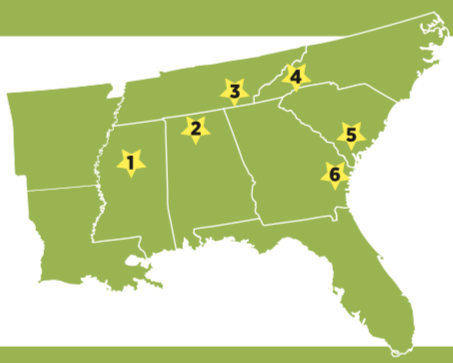2017 Southeast Sustainable Communities Fund invests $1.5M across six Southeast communities.

2017 Communities
- Environmental Justice Planning to Withstand Impacts of Climate Change in Duck Hill, Mississippi
- Crowdsourcing Community Donations to Fund Energy Retrofits for People with Low Income in Huntsville, Alabama
- Saving Energy and Building Wealth Through Energy Retrofits in Chattanooga, Tennessee
- Reducing Peak Energy Demand in the Winter through Weatherization Retrofits in Buncombe County, North Carolina
- Community-Led Problem Solving: Market Barriers to Financing Energy Retrofits in Charleston, South Carolina
- Eyesore to Assets: Community Resilience through Green Infrastructure on Vacant Lots in Savannah, Georgia
Contact:
Meg Williams Jamison
SSCF Fund Manager
meg@southeastsdn.org
The Southeast Sustainable Communities Fund (SSCF) will invest $1,583,244 in six Southeastern U.S. communities. Grantees will implement projects that build equitable local solutions to climate change. In this inaugural year, the SSCF received 35 applications from 9 states. This large applicant pool is a testament to the need for local climate change solutions in the south, and the ambition of local communities to make an impact.
The SSCF is a partnership between The Kendeda Fund and the Southeast Sustainability Directors Network (SSDN). “I am impressed by the breadth of communities interested in the program goals, as well as the range of local approaches to equitably address climate change.” Dennis Creech, Fund Advisor at The Kendeda Fund. Visit www.southeastsdn.org to learn more about the grant fund.

Environmental Justice Planning to Withstand Impacts of Climate Change
Community: Duck Hill, MS
Investment: $300,000
Partners: Action Communications and Education Reform (ACER); EcoAdapt; Sustainability Works; Mississippi State School of Architecture, Art and Design
Challenge: The rural town of Duck Hill currently addresses stormwater drainage through a system of ditches that frequently flood during periods of heavy rainfall and take several days for the water to recede. Additionally, these floods close the only community-gathering place and recreation center in the community.
Solution: Community members will create an adaptation and resiliency plan using the US Environmental Protection Agency’s Environmental Justice Collaborative Problem Solving (CPS) Model. This plan will become the backbone to the town’s Zoning and Land Use Plan, which hasn’t been updated since 1975. Furthermore, a green infrastructure and water drainage project will end the flooding in the cherished community recreation center.
Crowdsourcing Community Donations to Fund Energy Retrofits for People with Low Income
Community: Huntsville, AL
Investment: $300,000
Partners: Salvation Army of Huntsville; Huntsville Municipal Utility Challenge: Last year over 10,000 people applied for one-time utility bill assistance in Huntsville and this number is growing. Most families apply for assistance on their highest bills, often following weather events with extreme heat or cold. Project Share, a bill assistance program of Huntsville Utilities, was designed to support hardship cases from unforeseen circumstances, not necessarily extreme weather events. Project Share needs to expand beyond bill assistance to include energy efficiency and weatherization retrofits. Solution: Partners will establish an ongoing campaign to crowdsource donations in support of Project Share’s expansion to include home weatherization and energy efficiency retrofits. The crowdsourcing mechanisms to be piloted include on-bill donations from utility customers and on-paycheck employee donations from local employers, including the City of Huntsville, the utility, and large local employers. Additionally, this project will begin providing home energy retrofits for applicants to Project Share.
![]()
Saving Energy and Building Wealth Through Energy Retrofits
Community: Chattanooga, TN
Investment: $300,000
Partners: Electric Power Board (EPB); green|spaces; Chattanooga Community Action & Advisory Groups
Challenge: In four Chattanooga neighborhoods, residents with low income are using 43% more energy per square foot than the average home in Chattanooga, equating to $500 - $600 per month.
Solution: 1. Wealth Building: Leverage an existing training and job placement program for young adults who are underemployed by incorporating a focus on energy retrofit skills. 2. Energy Retrofits: The trainees will work with technical experts to provide energy efficiency improvements for 3,000 households with low income to reduce their electric utility bills. 3. Improve Existing Services: Partners will pursue continuous improvement of existing programs. Examples of steps to be taken include translating all materials into Spanish and adding energy efficiency options to the home repair program.
![]()
Reducing Peak Energy Demand in the Winter through Weatherization Retrofits
Community: Buncombe County, NC
Investment: $300,000
Partners: City of Asheville, NC; Community Action Opportunities of Buncombe and Madison County; Duke Energy Progress; North Carolina Sustainable Energy Association
Challenge: Peak energy demand in the mountains of Buncombe County is driven by cold winter mornings, which results in sharply peaking demand for electric heating.
Solution: This project will reduce peak electricity demand through weatherization and energy efficiency upgrades in communities
with low income. First, project partners will participate in an equity training and apply an equity framework to local energy program design. Then partners will centralize, streamline, and expand access
to weatherization and energy efficiency upgrades for households with low income. The retrofits conducted through this project will create a proof of concept to the electric utility for whole-home retrofits.
![]()
Community-Led Problem Solving: Market Barriers to Financing Energy Retrofits
Community: Charleston, SC
Investment: $150,000
Partners: The Sustainability Institute; Charleston Promise Neighborhood; Charleston Resiliency Network; Insurance Institute for Business and Home Safety; South Carolina Electric and Gas Company; Solarize Charleston; College of Charleston; Heritage Trust Federal Credit Union
Challenge: Many tools to finance energy retrofits are not applicable to the financial circumstances of people with low income.
Solution: Charleston communities of low income will work with project partners to address market barriers to energy efficiency retrofits and solar energy. By conducting energy efficiency and solar pilot projects, this project will implement pilot project retrofits to test new solutions, then create a broad community implementation plan to address the unique market challenges in the city’s communities of low income.
![]()
Eyesore to Assets: Community Resilience through Green Infrastructure on Vacant Lots
Community: Savannah, GA
Investment: $233,244
Partners: Savannah Tree Foundation; Victory Gardens; Savannah Impact Program; UGA Marine Extension and GA Sea Grant Challenge: In 2016, Hurricane Matthew caused significant damage to Savannah’s tree canopy and neighborhoods, costing $13 million in tree debris removal and unknown losses in water storage from mature trees. In addition, neighborhoods with low income contain more than 350 flood-prone FEMA vacant lots that are underutilized assets and contribute to urban blight.
Solution: Project partners will improve the community’s resilience to the effects of major storm events by using flood-prone FEMA lots in Savannah’s neighborhoods with low income for urban tree nurseries and green infrastructure pilot projects. The project will be implemented through a green-job training and job placement program with community partners to support wealth building and climate resiliency via the same project.